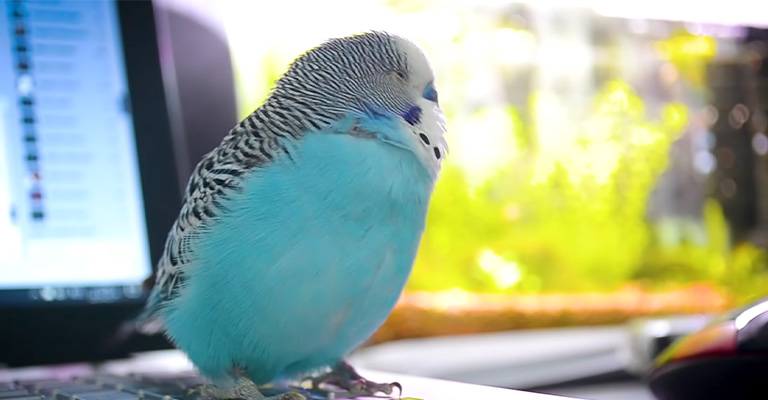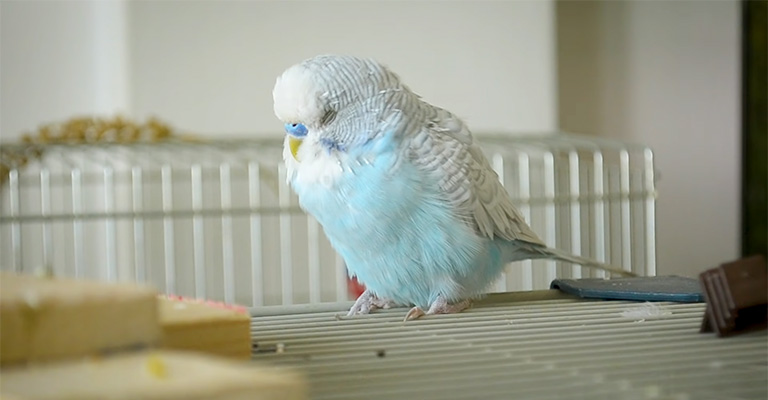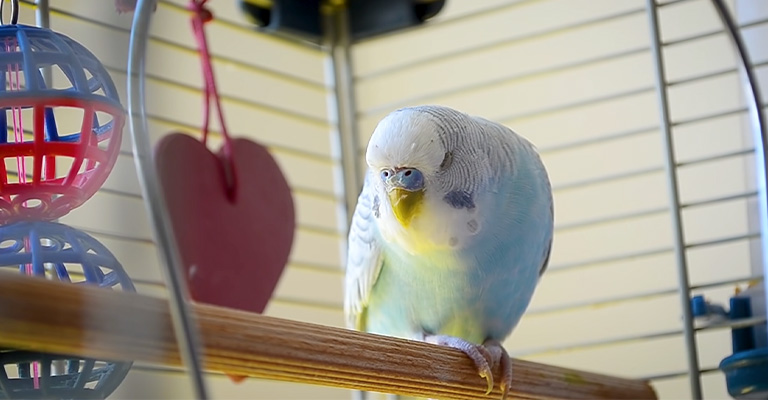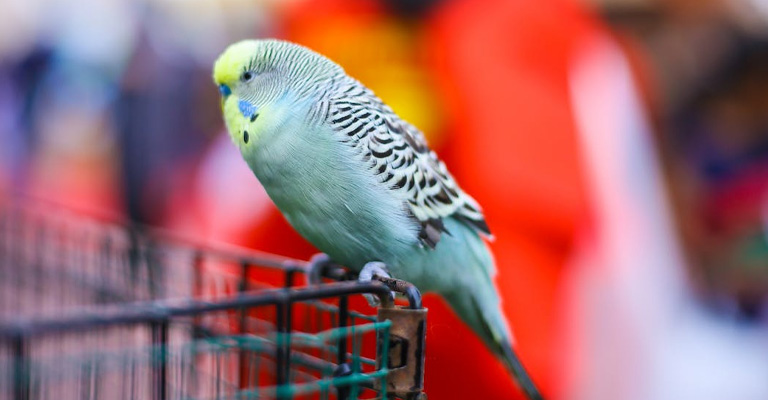Budgerigars, more commonly known as budgies or parakeets, are beloved pet birds known for their vibrant colors, playful nature, and ability to mimic human speech.
As responsible budgie owners, we need to provide them with a comfortable and conducive environment to rest and rejuvenate.
However, many bird enthusiasts often wonder whether can budgies sleep with noise present in their surroundings. In this article, we will delve into the fascinating world of budgie sleep patterns and explore whether they can tolerate noise during their slumber.

Can Budgies Sleep with Noise?
Budgies have unique sleep patterns that differ from humans and other animals. Unlike humans, who experience consolidated sleep during the night, budgies have a pattern of polyphasic sleep. This means they sleep for shorter durations throughout the day and night.
In the wild, budgies are diurnal creatures, active during daylight hours and seeking rest during the night. However, in captivity, they may adapt to their human caregivers’ sleep-wake cycle and adjust their patterns accordingly.
While in captivity, take the following measures:
Consistent Sleep Schedule
Establish a regular sleep schedule for your budgie by providing a quiet and dim environment during their preferred sleep times. This will help them adjust and develop a predictable sleep pattern.
Noise Control
Minimize loud or sudden noises in the vicinity of your budgie’s sleeping area. Close windows to reduce outdoor noise and consider using soundproofing materials if needed.
Cage Placement
Position your budgie’s cage in a quiet area of your home, away from high-traffic areas, TVs, and other sources of loud noises. This will help create a peaceful atmosphere for their sleep.
Gentle Covering
Some budgie owners use a light cover or cage blanket to create a cozy and secure sleeping space for their birds. This can help reduce external stimuli and provide a sense of privacy during sleep.
Reasons Why Budgies Can Sleep With Light Noise

Budgies are native to the Australian outback, where they are exposed to various sounds and noises in their natural environment.
Over time, they have developed an adaptive ability to sleep with light noise, as it is part of their survival mechanism. Here are the reasons why buddies can sleep with light noise:
Natural Vigilance
Budgies possess a natural vigilance that allows them to remain partially aware even during sleep. This trait helps them stay alert to potential dangers while still getting the rest they need. Therefore, they can sleep with light noise without being overly disturbed.
Social Nature
Budgies are highly social birds that live in flocks in the wild. In such communal living situations, it is common for noise to be present throughout the day and night. Their social nature has enabled them to adapt to sleeping with noise, as it is a regular occurrence in their natural habitat.
Habituation
Budgies can habituate to certain noises over time. If they are consistently exposed to a particular level of noise, they can become accustomed to it and perceive it as part of their normal environment. This habituation allows them to sleep undisturbed even with light noise.
Flexibility in Sleep Patterns
Budgies have a flexible sleep pattern, consisting of multiple short sleep episodes throughout the day and night. This polyphasic sleep pattern enables them to adjust their sleep schedule to fit their surroundings. Consequently, they can find restful sleep even with light background noise.
It is important to note that while budgies can sleep with light noise, it is still essential to provide them with a quiet and peaceful environment whenever possible.
Excessive or loud noises can cause stress and sleep disturbances, which can negatively impact their overall well-being.
Reasons Why A Quiet Environment Is Beneficial For Budgies

A quiet environment can be highly beneficial for budgies (also known as parakeets) due to their sensitive nature and specific needs. Here are several reasons why a quiet environment is beneficial for budgies:
Reduces Stress
Budgies are delicate creatures and can easily become stressed by loud noises or constant disturbances. A quiet environment provides them with a sense of security and calmness, helping to reduce their stress levels.
Encourages Natural Behavior
Budgies are active and curious birds, and a quiet environment allows them to engage in their natural behaviors more comfortably. They can explore their surroundings, play with toys, and vocalize without feeling threatened or interrupted.
Promotes Better Sleep
Budgies require adequate sleep for their overall health and well-being. Excessive noise or disturbances can disrupt their sleep patterns, leading to sleep deprivation and potential health issues. A quiet environment provides them with a peaceful atmosphere, allowing for undisturbed and restful sleep.
Enhances Bonding and Socialization
Budgies are social animals and form strong bonds with their human caregivers and other budgies. A quiet environment facilitates communication and interaction between budgies and their owners, as well as between budgies themselves. It allows for focused attention and uninterrupted bonding moments.
Encourages Mental Stimulation
Budgies are intelligent birds and thrive on mental stimulation. A quiet environment enables them to concentrate and engage in activities that stimulate their minds, such as solving puzzles, playing with toys, or learning new tricks. In a quiet space, they can focus better and fully explore their surroundings.
Reduces Potential Health Issues
Stress caused by a noisy environment can have detrimental effects on a budgie’s health. It can weaken their immune system, lead to feather plucking or other self-destructive behaviors, and even cause digestive problems. A quiet environment helps to minimize these risks and promotes overall good health.
Remember, while a quiet environment is beneficial, it’s important to provide budgies with appropriate socialization, mental enrichment, and interaction with their caregivers. They still require regular social contact and mental stimulation to lead happy and healthy lives.
Do Budgies Sleep with Their Eyes Open?

No, budgies do not sleep with their eyes open. Budgies, like most birds, have a protective membrane called the nictitating membrane or third eyelid. When they sleep, this membrane closes partially or fully, giving the appearance that their eyes are closed.
It helps to protect their eyes from dust, drafts, and other potential irritants while still allowing them to remain aware of their surroundings to some extent. So even though their eyes may not be completely closed, budgies do experience a form of sleep where they rest and relax.
How to Help Your Budgie Sleep
To help your budgie get a good night’s sleep, here are some tips:
Provide a Quiet and Dim Environment
Create a peaceful atmosphere in the room where your budgie sleeps. Close doors and windows to minimize outside noise and disturbances. Consider using curtains or blinds to darken the room slightly, as budgies are sensitive to light when sleeping.
Establish a Consistent Sleep Schedule
Budgies thrive on routine, so it’s helpful to establish a consistent sleep schedule. Ensure they have a set bedtime and wake-up time each day. Aim for around 10 to 12 hours of uninterrupted sleep during the night.
Cover the Cage Partially
Budgies feel more secure when their cage is partially covered. Use a lightweight, breathable cover or a cage cover specifically designed for birds. Covering the cage partially can help block out excess light and provide a cozy and secure sleeping environment.
Minimize Disturbances
During your budgie’s designated sleep time, try to minimize any disturbances or loud noises in the vicinity. Avoid playing loud music or having television or other electronic devices at high volumes near their cage.
Maintain a Comfortable Temperature
Budgies are sensitive to temperature extremes. Ensure the room where they sleep is at a comfortable temperature, ideally between 65°F to 75°F (18°C to 24°C). Extreme heat or cold can disrupt their sleep.
Provide a Comfortable Sleeping Area
Budgies prefer to sleep on a comfortable perch. Offer them a soft, cozy perch or a sleeping hut within their cage where they can feel secure and comfortable during their sleep.
Establish a Bedtime Routine
Establishing a bedtime routine can signal to your budgie that it’s time to wind down and prepare for sleep. Dim the lights in the room, offer a small bedtime snack (such as a few millet sprays), and engage in quiet activities with your budgie before they settle in for the night.
Remember, each budgie is unique, and it may take some time for them to adjust to a new sleep routine. Be patient and observe their behavior to ensure they are getting sufficient sleep and rest.
FAQs
While budgies have a remarkable ability to tolerate noise, prolonged exposure to excessively loud noises can potentially harm their sensitive hearing, both during sleep and while awake. It is crucial to maintain a quiet environment to protect their hearing health.
Common noise sources that can disrupt your budgie’s sleep include loud music, construction sounds, vacuum cleaners, barking dogs, and other high-decibel disturbances. It is advisable to minimize these noises or create a buffer zone to shield your budgie from excessive sound.
If your budgie’s sleep is frequently interrupted by noise, you may notice signs of restlessness, increased alertness, or even startled behavior. They may appear less active or exhibit signs of fatigue during their awake hours. It is important to observe their behavior and make adjustments accordingly.
Covering your budgie’s cage at night can serve multiple purposes. It not only helps create a dark and quiet sleeping environment but also offers a sense of security and privacy for your bird. Use a light cover or cage blanket that allows for proper airflow and prevents complete darkness.
While budgies are generally adaptable to ambient noise, certain low-level sounds, such as soft instrumental music or nature sounds, can have a calming effect on them. These gentle sounds can provide a soothing background while your budgie rests.
Final Words
So, now you know whether can budgies sleep with noise. While budgies are adaptable and can tolerate some noise during their sleep, it is essential to provide them with a calm and peaceful environment.
Understanding their unique sleep patterns and taking steps to minimize excessive noise will ensure that your feathered friend enjoys restful slumber, promoting their overall well-being.
By considering their needs and creating a suitable sleeping environment, you can help your pet budgie lead a happy and healthy life.